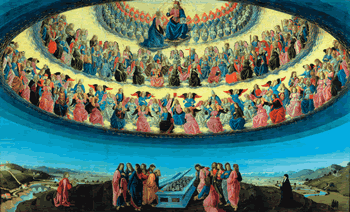Glorified Bodies

Bill Lambert
When we say the Apostles’ Creed we affirm our belief in the resurrection of our bodies in the next life. It rolls easily off the tongue, but to grasp the reality of those words seems way above our heads.
We are left wondering ... what in heaven will our resurrected bodies be like?
Let’s see what the New Testament has to tell us.
In the First Letter to the Corinthians Paul tells us that what is made of flesh and blood cannot share in God’s kingdom, and what is mortal cannot possess immortality.
‘Listen to this sacred truth ... when the last trumpet sounds we shall all be changed in an instant, as quickly as the blinking of an eye. The dead shall be raised, never to die again, and we shall all be changed into what is immortal’ (1 Cor 15:51-53).
Paul tells us we shall be like the resurrected Christ: ‘We will wear the likeness of the man from Heaven - Jesus Christ’ (1 Cor 15:49).
... words cannot describe the glories in store for us ...
So what do we know of the resurrected Christ?
The New Testament tells us that his resurrected body was not subject to the laws governing this world - the laws of time and space. He was able to walk into the locked upper room where the disciples hid from the Jews. Yet, his body was real like ours, in as much as he could be touched by the unbelieving Thomas. ‘Feel me and you will know, for a ghost doesn’t have flesh and bones as you can see that I have’ (Luke 24:39 & John 20:27).

The Assumption of the Virgin, Francesco Botticini, 15th century
Although John’s gospel seems to suggest that Jesus ate fish with his apostles when he appeared to them by the shore of Lake Tiberius, it does not go so far as to say that, though it does say that he ate fish in Luke’s Gospel (24:41-43).
Yes, his glorified body was not subject to the laws which govern everything in this world.
He was not easy to recognise in his glorified form. When Mary Magdalen met him on his rising from the tomb she first thought he was one of the gardeners. It was only when he spoke her name that she knew who he was. The two disciples who met him on the road to Emmaus recognised him only when he broke the bread and gave it to them. The seven disciples at Lake Tiberius failed to recognise him. It was only after the miraculous haul of fish that John said to Peter, ‘It is the Lord!’ (John 21:7).
So our resurrected bodies take on a new glory of their own. St Paul tells us that the beauty which belongs to our heavenly bodies is different from the beauty that belongs to our earthly bodies. Paul, who seemingly was given a vision of heaven, said words cannot describe the glories in store for us.
That is what the New Testament, the Good News, has to tell us. Time will be no longer; just an everlasting, heavenly now...
The next time you say the Creed, it could be good to pause to let your imagination take you a step further.
 Entries(RSS)
Entries(RSS)